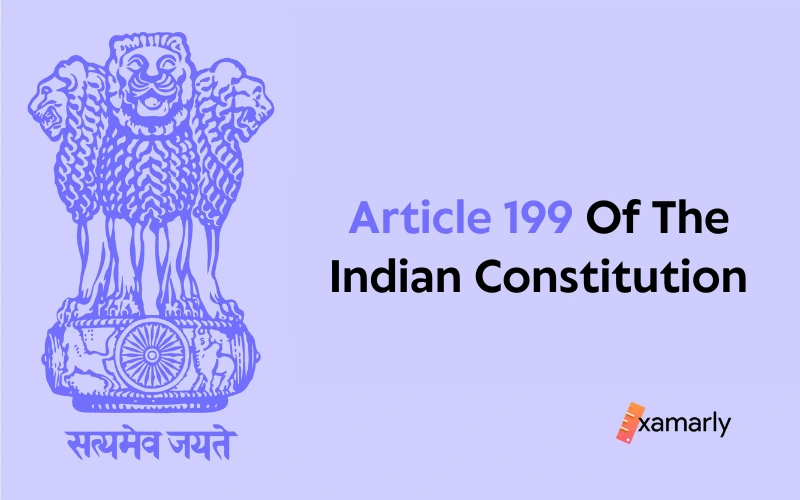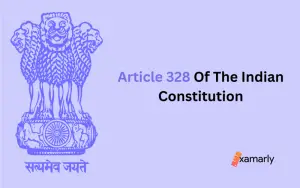An Overview
Being the largest democracy in the world, India follows the democratic form of governance. There are three organs of the government, namely- the Legislative, the Executive, and the Judiciary. Legislature is that body that is responsible for making laws. These laws are finalised from Bills.
In simple terms, a Bill is a proposed piece of legislation that is currently being considered by a Legislature. For the Bill to become a law, it must first receive the approval of both the Houses of the Legislature.
Article 199 of the Indian Constitution focusses on the definition of Money Bills. A Money Bill refers to a Bill that deals with the allocation of funds. In other words, the Bills relating to finances, such as those concerning taxes and public spending, are referred to as Money Bills. These Bills are one of the many types of Bills that are a part of our Constitution.
To know more about Article 199 of the Indian Constitution and the provisions it provides with respect to the Money Bills, read on till the end.
- An Overview
- Article 199 Of The Indian Constitution: Provisions For Defining Money Bills
- Clause (1) Of Article 199 Of The Indian Constitution: Explained
- Clause (2) Of Article 199 Of The Indian Constitution: Explained
- Clause (3) Of Article 199 Of The Indian Constitution: Explained
- Clause (4) Of Article 199 Of The Indian Constitution: Explained
- Summing Up
- FAQs Related To Article 199 Of The Indian Constitution
- Which Chapter Does Article 199 Of The Indian Constitution Fall Under?
- How Many Types Of Bills Are There In India And Which Are Those?
- Is GST Bill A Money Bill?
- Which Other Article Of The Indian Constitution Deals With The Money Bills?
- How Many Clauses Are There In Article 199 Of The Indian Constitution?
- Under Clause (3) Of Article 199 Of The Indian Constitution, Which Government Official Has The Authority Over A Money Bill?
Article 199 Of The Indian Constitution: Provisions For Defining Money Bills
Article 199 exclusively revolves around the Money Bills. It takes into account the definition of these Bills and tries to set certain parameters for a Bill to qualify as a Money Bill. In other words, this article goes into the details of which Bills can be considered a Money Bill under the definition.
Article 199 of the Indian Constitution is constituted of four clauses, namely- clause (1), clause (2), clause (3), and clause (4). Let us look at each clause of this article one at a time and try to analyse the provisions it holds. These clauses have been quoted from the official document of the Constitution of India.
Clause (1) Of Article 199 Of The Indian Constitution: Explained
(1) For the purposes of this Chapter, a Bill shall be deemed to be a Money Bill if it contains only provisions dealing with all or any of the following matters, namely:—
(a) the imposition, abolition, remission, alteration or regulation of any tax;
(b) the regulation of the borrowing of money or the giving of any guarantee by the State, or the amendment of the law with respect to any financial obligations undertaken or to be undertaken by the State;
(c) the custody of the Consolidated Fund or the Contingency Fund of the State, the payment of moneys into or the withdrawal of moneys from any such Fund;
(d) the appropriation of moneys out of the Consolidated Fund of the State;
(e) the declaring of any expenditure to be expenditure charged on the Consolidated Fund of the State, or the increasing of the amount of any such expenditure;
(f) the receipt of money on account of the Consolidated Fund of the State or the public account of the State or the custody or issue of such money; or
(g) any matter incidental to any of the matters specified in sub-clauses (a) to (f).
The first clause id divided into several sub-clauses. These sub-clauses are seven in number and named as sub-clauses (a) to (g). The clause states that any Bill will be considered as a Money Bill under Chapter III of the Indian Constitution only when it contains the provisions for any of the sub-clauses or all of them out of a specified set of conditions.
These conditions are as follows:
If a Bill proposes the introduction of a new tax, the elimination of an existing tax, the reduction of an existing tax, the modification of an existing tax, or the regulation of an existing tax, then such bill will be treated as a Money Bill for the purposes of this chapter.
In addition to that, a Bill is considered to be a Money Bill if it incorporates the regulation of the borrowing of funds or any guarantee given by the State. The other condition is if it contains the alteration of the law with respect to any financial obligations that has been undertaken or is to be pursued by the State. In other words, if a Bill contains any of these provisions, it is considered to be a Money Bill.
Further, this Chapter defines a Bill as a Money Bill if it involves the custody of either the State’s Consolidated Fund or Contingency Fund. This would entail the payment or withdrawal of funds from either. A Bill would be considered a Money Bill if it appropriates the State’s Consolidated Funds.
Also, if a Bill involves the receipt of funds on behalf of the Consolidated Fund or the public account of the State, or if it contains the custody or issuance of such funds, then the Bill will be considered to be a Money Bill.
The final sub-clause of clause (1) mentions that if a Bill fulfils all the conditions required for being a Money Bill if it includes any thing that is related to any of the topics listed in sub-clauses (a) to (f) of the first clause of Article 199 of the Indian Constitution.
All of the above-mentioned terms and conditions are strictly for the purposes of Chapter III of the Indian Constitution.
Clause (2) Of Article 199 Of The Indian Constitution: Explained
(2) A Bill shall not be deemed to be a Money Bill by reason only that it provides for the imposition of fines or other pecuniary penalties, or for the demand or payment of fees for licences or fees for services rendered, or by reason that it provides for the imposition, abolition, remission, alteration or regulation of any tax by any local authority or body for local purposes.
The second clause of the article explains that a Bill cannot qualify to be counted as a Money Bill under the following conditions.
A Bill would not be considered a Money Bill just because it calls for fines or other monetary punishments. It still would not qualify because it calls for the requirement or the paying of fees for licences or services related fees. Lastly, a Bill would not come under the category of a Money Bill just because it says that a local authority or body can impose, get rid of, change, or regulate a tax. This is because the tax is used for local purposes.
Clause (3) Of Article 199 Of The Indian Constitution: Explained
(3) If any question arises whether a Bill introduced in the Legislature of a State which has a Legislative Council is a Money Bill or not, the decision of the Speaker of the Legislative Assembly of such State thereon shall be final.
If there is any doubt as to whether or not a Bill that has been introduced into the Legislature of a State that possesses a Legislative Council is a Money Bill, then the decision of the Speaker of the Legislative Assembly of such State shall be final. The Speaker has authority when it comes to determining whether or not the Bill is a Money Bill. This provision is contained in the third clause of Article 199.
Clause (4) Of Article 199 Of The Indian Constitution: Explained
(4) There shall be endorsed on every Money Bill when it is transmitted to the Legislative Council under article 198, and when it is presented to the Governor for assent under article 200, the certificate of the Speaker of the Legislative Assembly signed by him that it is a Money Bill.
The final clause of Article 199 states that every Money Bill must carry the certificate of the Speaker of the Legislative Assembly with his signature stating that the bill in question is a money bill. This is the procedure to be followed for every Money Bill before it can be sent to the Legislative Council in accordance with Article 198 of the Indian Constitution or when the Bill is presented to the Governor for assent in accordance with article 200. This certification must be affixed before the bill can be sent to either body.
Summing Up
Article 199 of the Indian Constitution delves into the terms and conditions that are associated with regard to a Bill being counted as a Money Bill.
The provisions provided by the clauses and sub-clauses of this article mention the various conditions have to be fulfilled by a Bill, only then will the Bill be called a Money Bill.
In this manner, the above article tries to create certain pointers with the aim of trying to achieve a definition of the Money Bills.
FAQs Related To Article 199 Of The Indian Constitution
Which Chapter Does Article 199 Of The Indian Constitution Fall Under?
Article 199 of the Indian Constitution falls under Chapter III of the Indian Constitution. Chapter III is titled as ‘The State Legislature’. The above article is included under the category of Legislative Procedure.
How Many Types Of Bills Are There In India And Which Are Those?
Broadly speaking, there are five different types of Bills. These are Ordinary Bills, Money Bills, Financial Bills, Constitutional Amendment Bills, and Ordinance Replacing Bills.
Is GST Bill A Money Bill?
Yes, a GST Bill is a Money Bill. This is because the GST Bill includes provisions for the levying and repealing of taxes. It also includes provisions for the allocation of money out of the Consolidated Fund.
Which Other Article Of The Indian Constitution Deals With The Money Bills?
Article 110 of the Indian Constitution is another such another besides Article 198 which contains provisions for defining the Money Bills.
How Many Clauses Are There In Article 199 Of The Indian Constitution?
Article 199 of the Indian Constitution has four clauses, namely- clause (1), clause (2), clause (3), and clause (4). Out of this, the first clause is further divided into several sub-clauses.
Under Clause (3) Of Article 199 Of The Indian Constitution, Which Government Official Has The Authority Over A Money Bill?
Clause (3) of Article 199 of the Indian Constitution renders authority on the Speaker of the Legislative Assembly to give his final verdict on whether a Bill will be counted as a Money Bill or not.






